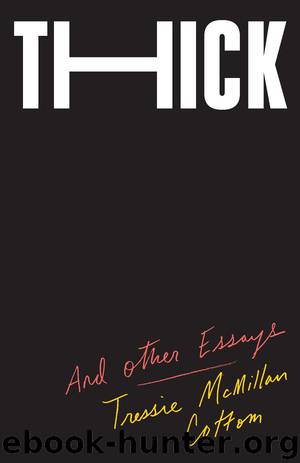Thick by Tressie McMillan Cottom

Author:Tressie McMillan Cottom
Language: eng
Format: epub
Publisher: The New Press
Published: 2018-03-15T00:00:00+00:00
Black Is Over (Or, Special Black)
I’m looking for a mixed girl
Asian, Jamaican
I’m looking for a mixed girl
Puerto Rican, Haitian
I’m looking for a mixed girl
Cuban and White
I’m trying to get mixed up tonight like
Excuse me miss, what’s your name, where ya from, can I come
—T-Pain, “Mix’d Girl”
“Black people are over.” That is how it was said to me once. The occasion was a meeting of professors who were working together on a student project. It was a “people of color” cabal. If pressed to do so at a glance, one might have said that everyone in the room was black. In a discussion of methods and theories and other such things that comprise a significant part of my job, one of the women—we were all women—said assuredly that we have moved on, past black and white. Hence, “black people are over.” I did not feel over and I am most certainly black. But it was said so casually because of the kind of black that I am presumed to be in rooms such as these. There have been many such rooms and I end up in more of them, more frequently, the more I inch up the class ladder. The proclamation makes a mistake of assuming that black people, like me, were only ever a problem and not a people.
But, first, just what kind of black am I? It is actually a common question. A senior scholar of great standing in my profession once said to me, “I do not trust you. Too many white people like you.” Which, ouch. He also told me that being a dark black woman would prove a problem for me in academia. I am glad a man finally told me that, I tell you what. This was all said with great affection, by the way. I had passed a test for what kind of black I was. It is a political question—do I align myself with the interests of black people? I do. Only, the question can be more complicated depending on which black people are in question.
Do I align myself with black people across the diaspora? With black people on the political left or the political right? With black people who have a nonblack parent? With black people who prefer African American or nigga? The easy answer is that I am basic black. The harder answer is that it’s never as easy as it sounds. What has been offered to me or denied me in parts, at different times, are opportunities to agree that black people are over. I can never know what the people who offer me this are thinking, but it seems that the offer is conditioned on that darkness and womanness the great man scholar told me would be a professional problem.
This was not a problem I remember experiencing growing up. I knew that not all black people were like us. I spent time in New York with Dominicans and black Puerto Ricans who would fight if you called them black. One of my mother’s best friends was a Haitian chef named Henry George.
Download
This site does not store any files on its server. We only index and link to content provided by other sites. Please contact the content providers to delete copyright contents if any and email us, we'll remove relevant links or contents immediately.
| General | Discrimination & Racism |
Nudge - Improving Decisions about Health, Wealth, and Happiness by Thaler Sunstein(7689)
The Fire Next Time by James Baldwin(5421)
iGen by Jean M. Twenge(5403)
Adulting by Kelly Williams Brown(4561)
The Sports Rules Book by Human Kinetics(4377)
The Hacking of the American Mind by Robert H. Lustig(4363)
The Ethical Slut by Janet W. Hardy(4236)
Captivate by Vanessa Van Edwards(3835)
Mummy Knew by Lisa James(3680)
In a Sunburned Country by Bill Bryson(3528)
The Worm at the Core by Sheldon Solomon(3480)
Ants Among Elephants by Sujatha Gidla(3458)
The 48 laws of power by Robert Greene & Joost Elffers(3219)
Suicide: A Study in Sociology by Emile Durkheim(3009)
The Slow Fix: Solve Problems, Work Smarter, and Live Better In a World Addicted to Speed by Carl Honore(3001)
The Tipping Point by Malcolm Gladwell(2903)
Humans of New York by Brandon Stanton(2864)
Handbook of Forensic Sociology and Psychology by Stephen J. Morewitz & Mark L. Goldstein(2691)
The Happy Hooker by Xaviera Hollander(2682)
